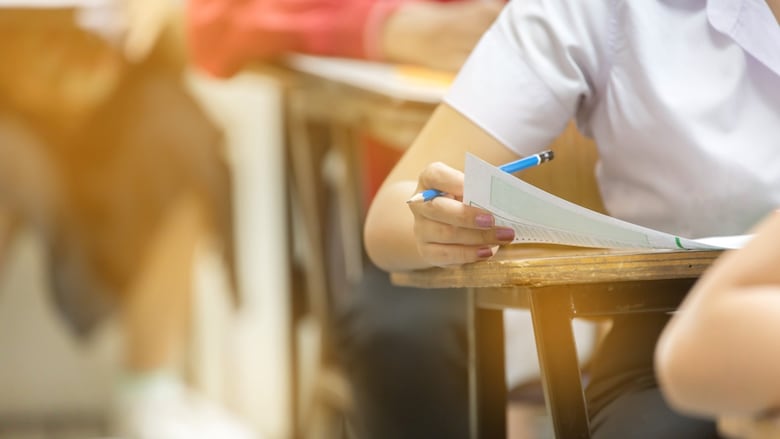Nobody likes to take exams — but they might be more valuable than you think
Tests measure what students know, but also help build important life skills, education experts say


As high schools across Canada wind down for the academic year, students are entering the final stretch of their exams — a period marked by both anticipation and anxiety.
At Castlebrooke Secondary School in Brampton, Ont., science teacher Jason Bradshaw watches the pressure build. For many of his students, he says, the emotional toll is visible.
"They are very stressed, and I think it's largely because of the emphasis that we put on grades and marks in school, and the final exam is obviously going to be a significant part of that," Bradshaw told The Current's Matt Galloway. "It's a very high-stakes task for them and that puts enormous stress on them."
For teenagers juggling study schedules and extracurriculars with the looming pressure of acting upon their ambitions for the future, exam season can feel like a make-or-break moment.
In fact, some educators in Canada have also questioned whether the traditional testing model is worth the anxiety it generates.
But others see a different side.
Kelly Gallagher-Mackay, an associate professor and educational researcher at Wilfrid Laurier University in Waterloo, Ont., says that tests offer a valid form of assessment, measuring learning in ways that are distinct from other methods, such as projects.
"There is a point of testing," she said.
What do exams distinctly tell us?
Exams play a crucial role in gauging how well students have grasped the core concepts of their courses, says Gallagher-Mackay.
Furthermore, she says that exams also help educators assess not only what their students have absorbed but how effective their teaching methods have been throughout the year.
"It's particularly important for going forward. The test might tell you that you want to go and teach that differently next year, if there's one unit that they really didn't get," she said.
"It gives you a sort of overall snapshot of the extent to which the content and the teaching were effective."
Tasha Ausman, a science and mathematics high school teacher in Gatineau, Que., and a professor in the faculty of education at the University of Ottawa, says exams are more than just a measure of content knowledge.
She says they're also tools for evaluating literacy — both general and subject-specific.
"They're testing, fundamentally, a literacy and deciphering skill in relation to content where you may or may not know it," said Ausman.
In addition to comprehension, she says exams help solidify memorized, factual knowledge — especially critical in subjects like science and math, where understanding core concepts is essential.
"I try and emphasize as a teacher, 'Hey, listen, you're living in this body, you should probably know where all your bits are [and] how your organs work,'" she said.
However, Ausman remarks that today's students — raised in a digital-first world — often question the need to remember facts when information is readily available online.
"I had a few students say, and it might not be just this generation, but like they're more apathetic about, 'Why do I even need to know this? I can just Google it,'" she said.

Yet Ausman believes exams serve another vital function: preparing students for the pressures and expectations of adult life.
She points to the practical life skills that emerge from test-taking. Facing a timed, high-pressure scenario — like completing an exam within three hours — mirrors real-world responsibilities where deadlines matter.
"Life is full of deadlines, it doesn't matter what job you're doing," said Ausman.
Test-taking, she says, teaches more than curriculum content. "Reliability, commitment, obligation, organization, all those things come through schooling as well," she said.
Strategies to manage test anxiety
Back in Ontario, Bradshaw acknowledges that tests are "not going anywhere in the immediate future."
So, alongside fellow educators, he is putting a spotlight on the need to help students manage the anxiety that often comes with test taking.
Regarding final exams, Bradshaw advocates familiarizing students with testing throughout the semester. By incorporating lower-stakes assessments, he believes students can gradually build confidence and ease the intense pressure that final exams often bring.
Louis Volante, professor of education at Brock University, also says there are practical ways both teachers and students can address general test anxiety.
From a teaching perspective, Volante encourages educators to offer clear test-taking strategies such as reading questions carefully, previewing the entire exam before you start, skipping difficult questions initially and managing time effectively.

For tests to be fair and supportive of student learning, Volante says teachers should design exams that 90 per cent of students can finish with 15 minutes to spare, allowing enough time for everyone to complete them.
They should also include a mixture of selected-response questions like multiple choice, true or false and matching, alongside constructed-response questions such as those that require short answers.
"We want a mixture of questions that we're asking students because it's tapping into different types of knowledge and skills they would have learned and can apply," said Volante.
Content-wise, he says tests should have a good match between what's taught and what's tested.
"What you often hear from students is, 'I studied everything that was taught in class, but the test asked me a bunch of questions that we didn't really cover,' and obviously, that's going to create anxiety for anybody."
Finally, Gallagher-Mackay says that parents also play a key role in keeping the pressure in perspective.
"When parents and teachers are more or less giving consistent messages, kids do feel better about school and they do better at school," she said.
That message is this: "Tests are not the end all and be all — they are not a measure of who you are as a person, they are a valid way of assessing what you learn in a particular course."
Interview with Jason Bradshaw and Louis Volante produced by Enza Uda and Cecelia Armstrong.

